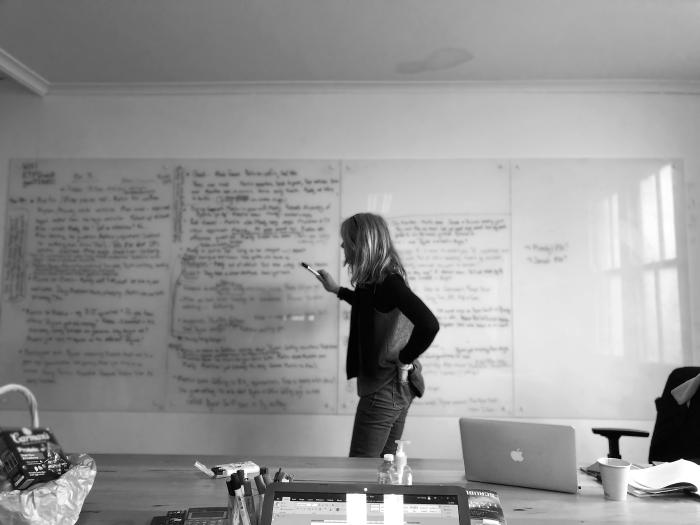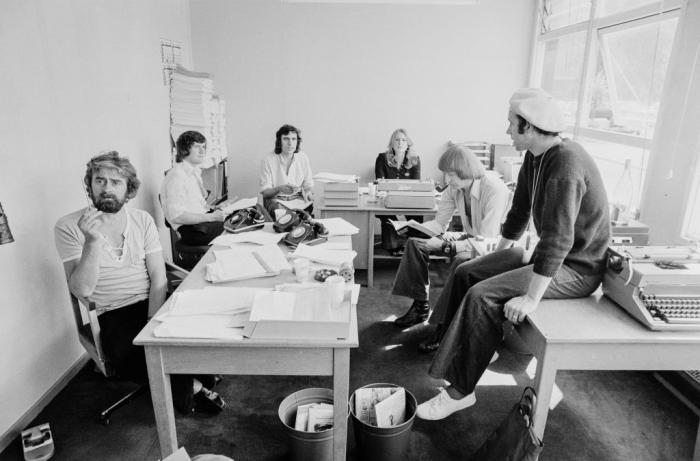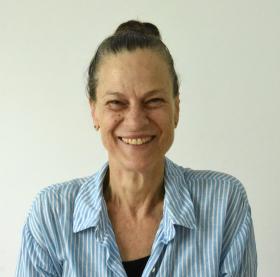It’s a confronting experience to find yourself a novice, deep in middle age.
For the past year or two, I’ve been working on screen adaptations of other people’s novels for television and developing original screenplays for both film and TV. This has happened for a variety of reasons, but almost every Australian novelist needs to have a side hustle. We write novels for the love, apparently.
So it’s either try paying the school fees with love, or find a second job. Over the decade I’ve been doing this, the second jobs have varied wildly — teaching law students law, teaching writing students writing, talking, talking, talking, writing corporate copy, editing a magazine, plumbing the insides of the world’s most boring databases and even helping out at a surf school. Teaching landlubbers surfing, I guess.
Screen work, into which I was ushered by the generosity of friends, is the closest I’ve come to the same instincts that drive the writing of a novel. I might call myself a novelist, but what that term means underneath is that I tell stories.
So what happens when the instinct remains the same but the mode changes? What follows is some of what I learned when I became a screen storyteller.
In the garden shed, ideas progress in linear fashion. There is me, and there is me. I come up with an idea, and I ask myself if it’s a good one. I go out and pull weeds from the vegie patch, mozzies attacking the exposed flesh between belt and shirt tails, while I interrogate the idea. Hundreds of ideas have died in that vegie patch and fertilised its soil, later ingested by my family as broad beans or tomatoes, and there I will end the analogy. The ideas that survive go into the work, and they stay there.

In a writers’ room, on the other hand, everything is far from linear.
Firstly, there’s this timidity about venturing ideas at all. Some rooms are full of very smart people, or very funny people, and to push your particular dancing bear into the ring takes some fortitude. You find yourself defending it, trying not to be tetchy, trying not to plead. It takes real discipline to bite your tongue and be a good collaborator. Others are doing the same thing with their ideas, at the same time. You want to bend the arc of the story towards your ideas — that’s the ordinary creative impulse. But so does everyone else. It’s a roomful of well-intentioned people tiptoeing around, trying to be supportive and not talk over each other.
Far from being a cage fight (a common misconception. Maybe it is in LA — I’ve never worked there), your average room contains the gladdening spectacle of creative people on their best behaviour.
And to take the good vibes a little further, I’ve never had the sense that producers are in it for the wrong reasons. I mean, I know profit’s a thing. But every query, every backtrack and re-examination of the work seems to be driven by a desire to satiate the audience. Will they follow what we’re doing? Will they laugh here? Will they cry there? We’re all appeasing the same gods.
But to go back to the idea of ideas: writers’ rooms are about gestating them collectively. What if I can see a seventeenth-century country house in a forest, it’s probably haunted, and you can see it too, but — wait! — Is that Tilda Swinton in a bodice? What do you think, guys? Not this, right, but something like this … Who needs coffee?
The cultural product that is a TV show, or a film, is ultimately a compromise. For all the goodwill in the world, there is a fundamental question at play here: can ideas be the product of multiple minds and remain internally consistent? I think they can, but it’s a very different road to the solo one.
There is a cliché that says good books make bad films and, conversely, that bad books often make good films. I can’t possibly adjudicate, because I won’t risk the delicious aftertaste of a favourite book in its screen adaptation (see Killers of the Flower Moon, based on the book by David Grann. Or better still, don’t.) and I won’t bother watching the adaptation of a book that left me flat (Sally Rooney’s Normal People). Of course, there are exceptions: The North Water by Ian McGuire was a slithering, feverish masterpiece on paper, and the television adaptation not only captures that feel, but it’s got Colin Farrell in the lead role and they shot it on location in the Arctic sea ice.
I picked up a copy of Peter Benchley’s Jaws at a flea market when I was 11. I bought it because it had a cool shark on the cover. The Trojan horse in that reading experience was the sex — as graphic as the shark attacks. Then I saw the film and was freshly traumatised: this time only by the sharks. It’s perfectly cast and shot, the score is suitably menacing and the prodigious Steven Spielberg, at 26, seemed to have an uncanny array of tricks at his disposal (including, reputedly, starving the film’s colour mix of any red until the first attack, so the arterial blood would be all the more shocking).
But back to craft. People who tell stories on screen are looking for different values. They want pace, echoes of genre and what they call ‘comps’. Comps are comparative titles. In my experience, every proposed TV show is going to be like Top of the Lake, but only Season One. Or True Detective, but again, only Season One, the one starring Matthew McConaughey and Woody Harrelson. Films with Nicholas Cage in them are not comps. I’ve learned that it helps a lot with fitting in if you make regular references to the pilots of Breaking Bad, The Sopranos and Happy Valley.
Pace is vital in screenwriting: there is no tolerance for flat spots. No-one is interested in florid language, which of course is the opposite of literary fiction, where you can have all the flat spots you want as long as the adjectives are pretty.
There is always a note-taker in the room, and they always seem to be super-human humans. Note-taking, in an environment where thoughts are chaotically tipped into the air and either applauded fulsomely or dismembered by piranhas, is no easy thing. The note-takers are usually emerging film-makers: young, smart, and well versed in screen culture. My latent imposter syndrome is immediately awakened in such company. Some days you can sense them biting their tongue. They can see the bad ideas. They have good ideas. But the constraints of the role are such that they must remain silent. At the end of the day they turn out work of pinpoint accuracy (how did she know I was saying ‘verisimilitude’ when my mouth was full of trail mix?) and invariably manage to smile.
Screen people care enormously about food, and whiteboards. The former has been a surprise: I imagined endless coffee and mountains of doughnuts. The reality is bowls of fruit that no-one touches, chips and muesli bars, and plastic tubs filled with those bite-sized Cadbury bars, which is an open field if, like me, you’re the only one who likes Turkish Delight. Only sociopaths eat the chips (it’s a good early pointer) because they’re so damn noisy. The high point of the morning is the solemn Passing of the Menus, when lunch is selected and ordered. All creative effort ceases while this ritual is observed.
A note about the whiteboards: if you have neat handwriting, don’t let anybody see it under any circumstances. Otherwise you will spend the rest of your career with a marker in your hand jotting frantically while people yell, ‘Not this, but something like this ...’
It will come as no surprise that coffee is taken very, very seriously in writers’ rooms. To the point where I’ve broken my own rules about after-lunch coffees countless times and wound up a twitching, paranoid wreck, staring at a hotel ceiling at 3 am.
Over the time I’ve been doing this, I have built a list of aphorisms that screenwriters just love. Any moment of payoff in a screenplay must be ‘earned’. That is, it must be justified by the preceding material so that it feels satisfying. This makes intuitive sense, but it’s a rule often proved by the exceptions. Think of the Logan Roy funeral scene in Succession. The Roy patriarch was a right bastard: mean, belligerent and horribly manipulative of his adult children, and yet, as they try to eulogise him in a cathedral cynically packed with the rich and powerful, they’re inconsolable. Devastated. Son Roman falls apart. The moment is not, by any measure, ‘earned’, but it’s moving all the same.
If they hate an idea, your fellow writers will politely say that they ‘bump on’ it. As in, ‘I loved what you did with the apocalypse, but I bumped on the zombie netballers.’ And you might bump on it because it is ‘putting a hat on a hat’. Despite the jaunty mental picture it conjures, putting a hat on a hat is a bad thing. It means recapitulating an idea already made obvious. Another favourite is: ‘We can live a world where ...’ This is an odd formulation, but just imagine a scenario where we’ve decided that the helicopter we’d planned to shoot is too expensive, and as a result we can live in a world where we just get an FX guy to make whoopa whoopa noises off camera.
Screenwriters genuinely commit themselves to making the story feel authentic, and so there can be a lot of confessional stuff about people’s private lives. On the upside, this is indicative of a trusting room and a group of people who are willing to share personal experiences in the interests of the project. It can fuel the development of character and plot. It can also feel very jarring to grind the gears from ‘And that’s why I never talk to my parents’ to ‘Okaaay … so we’d better tidy up scene 32.’
It’s possible that it’s just me and my inexperience, but I find the work in the writers’ room utterly exhausting. A six-hour day is about as much as I can take. Inspiration stalls, replaced by the irritant buzz of caffeine. The world turns auburn out the window and the commuters crawl home while the fluorescents spike your eyeballs. Sometimes, I’ve found, taking the entire room out walking and talking is a good antidote to all this.
Time is the other big difference between the garden shed and the writers’ room. Where novels are a process of distillation — of percolating, clarifying seawater trickling through a thousand years of limestone and so on — screenplays depend on funding. And funding is eroded by delay. There are deadlines, and they’re not the kind that can go whooshing past, as Douglas Adams once put it. Dozens of people depend on those deadlines being met, so that they can place their piece of the work in an intricate, interlocking matrix with everyone else’s. So until that script is delivered, everything stops. All other ideas are shelved. Life itself seems to hold its breath.
Indeed, once the room is done, everyone goes away to their various burrows and lairs to do the actual writing.
Most screenwriting is done on software called Final Draft, which is basically Word with a bunch of default formatting — scene heading, action, dialogue and so forth. There’s one default called ‘parenthetical’ that answers my novelist’s need to do the staging, to explain people’s posture, their facial expressions, the inflection of their voices. And yet, this is Not On. Production abhors any stage directions’ — because it supplants the roles of the actor, the director, the cinematographer — all the people whose legitimate job it is to create and capture the gemstone glints of pathos that might win them an AACTA nomination.
When the writing phase is complete, you’re more or less at the same stage as when you deliver a novel to your publisher: functus officio, and awaiting the reader’s verdict. But this is when the screen form comes to life, of course, because things are nowhere near done. An unseen army of creative animals, known collectively as ‘production’ but incorporating directors, lighting, costume, make-up, stunts, set design, actors, casting agents, special effects and more, turn their combined talents on your work, and lift it into another realm.

This can be alarming: the witticisms you so fondly crafted can vanish, out of mere convenience or because they weren’t that good in the first place. But the feeling, watching the final product in terror, curled up in bed in another city months after the event, can also be one of elation. Look what they did! It looks so good! In episode one of Scrublands, watch the flashbacks to the mass shooting that is the backbone of the story. We wrestled with those flashbacks in the room for days, though I hasten to add it wasn’t because of my writing. With each reiteration of the shooting, the audience is shown a little more detail, and a little more, and a little more. It’s brutal, highly kinetic and suspenseful: a collection of ordinary words, lifted off the page and transformed into explosive action.
The singular act of authorship stacks an awful lot of the creative intricacy in a work on one pair of shoulders. But it’s a lie: there are multiple talented people behind every novel, despite there being only one name on the cover. All of which offers proof that the most ancient and enduring modes of storytelling are in fact the collaborative ones.
Jock Serong is a novelist and screenwriter, and a director of Melbourne’s Wheeler Centre for Books, Writing and Ideas. He has a PhD in creative writing and was the founding editor of Great Ocean Quarterly. His books include Quota (Text, 2014), The Rules of Backyard Cricket (Text, 2016), On the Java Ridge (Text, 2017) and the Furneaux Islands trilogy of novels about the colonisation of Bass Strait (Text, 2018–2022). He helped adapt Chris Hammer’s novel Scrublands for screen. His next novel is Cherrywood, out in September — screen rights have already been optioned.
This story appears in Openbook winter 2024.


